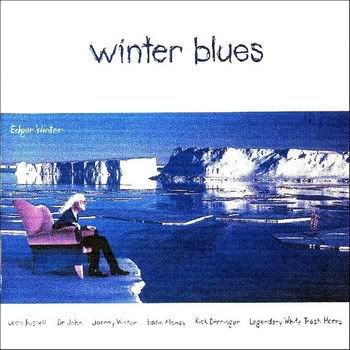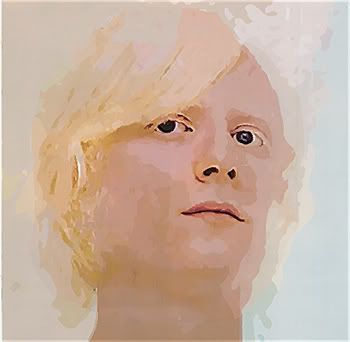
Edgar Winter - Winter Blues - 1999 - Rhino Records (USA)
A great electric blues rock album from Edgar Winter. There are no stand - out tracks, but the all star cast and great musicianship make for great listening. Buy his "Jazzin' the Blues" album, and give his great " Live in Japan" album a hearing.
TRACKS / COMPOSERS
1 Good Ol' Shoe (with Leon Russell)
2 Nu'orlins (with Dr. John/Bobby Kimball)
3 Texas
4 New Millennium (with Rick Derringer)
5 On the Tip of My Tongue (with Johnny Winter/Rick Derringer)
6 White Man's Blues (with Rick Derringer)
7 They Only Come Out at Night (with Frankie Sullivan)
8 It's Only Money (with Eddie Money)
9 Show Your Love
10 You Are My Song
All tracks composed by Edgar Winter, except Track 6, by Rick Derringer, Edgar Winter, Track 7, by Edgar Winter, Frankie Sullivan, and Track 10, by Edgar Winter, Curt Coumo
MUSICIANS
Edgar Winter (vocals, alto & baritone saxophones, piano, organ, synthesizer)
Johnny Winter, Rick Derringer, Frankie Sullivan, Mitch Perry (guitar)
Leon Russell, Dr. John (piano)
Vail Johnson, Mike McKinney, Charlie Torres (bass)
Rick Latham, Sterling Campbell (drums)
Louis Conte, Chuck Silverman (percussion)
Jon Smith (tenor saxophone)
Ken Tussing (trombone)
Steve Howard (trumpet)
Dean Roubicek (clarinet)
John Paris (harmonica)
Westy Westenhofer (sousaphone)
John Massari (strings)
Eddie Money, Bobbie Kimball (vocals)
Carl Anderson, Billy Trudel, John Mahon, Monte Kelley, Paul Pesco (background vocals)
REVIEW
Through steady work, Edgar Winter kept himself visible throughout the '90s, culminating with a pair of solid efforts for Intersound. Those appeared under the radar of popular consciousness, known only to hard rock and blues-rock fans. For the general public, Winter re-entered consciousness through a series of television commercials -- usually, they just featured his songs, but he was the star in a clever Miller campaign that suggested Winter and George Hamilton were twins -- along with a prominent song in the political satire Wag the Dog. All of this led to a contract with Pyramid Records and Winter Blues, his first large-scale, heavily promoted release in nearly 20 years. As is customary for any comeback release, Winter Blues is flush with cameos, but this time around, they make sense -- brother Johnny, Rick Derringer and Leon Russell have been long-time colleagues of Edgar, while Dr. John and (surprisingly) Eddie Money fit in quite nicely. Their presence is welcome, since Winter has never been the strongest of frontmen and they never take away from his guitar playing, which remains the best reason to hear Winter Blues. Anyone that paid attention to his Intersound releases would have realized that Winter has been cutting good, solid records in the '90s and this is no different, but anyone that hasn't followed him will be surprised how consistent this is. Really, there's nothing new here, since it's in the vein of his electrified blues and hard rock of the '70s, but it's done well and performed with conviction, resulting in an album that may not reach the heights of his classics, but certainly is among his most enjoyable and consistent works. In other words, it will please both the hardcore fans and listeners in the process of (re)discovering Winter. © Stephen Thomas Erlewine, All Music Guide

BIO
Although he's often skirted the edges of blues music, at heart, saxophonist, keyboardist and composer Edgar Winter is a blues musician. Raised in Beaumont, TX, the younger brother of ukulele player and guitarist Johnny Winter, Edgar Winter has always pushed himself in new directions, synthesizing the rock, blues and jazz melodies he hears in his head. As a consequence, his fan base may not be what it could have been, had he made a conscious effort -- like his brother Johnny -- to stay in a blues-rock mold over the years. He's one musician who's never been afraid to venture into multiple musical arenas, often times, within the space of one album, as in his debut, Entrance (1970 Columbia Records). Edgar Winter, the second son of John and Edwina Winter, was born December 28, 1946 in Beaumont, TX, and much of the credit for Edgar and Johnny's early musical awareness must go to the brothers' parents, who have been a constant source of encouragement throughout their respective musical careers. The boys' father sang in a barbershop quartet, in their church choir, and played saxophone in a jazz group. Edgar and Johnny, who's three years older, began performing together as teens, playing local watering holes like Tom's Fish Camp before they were old enough to drink. The pair's early R&B and blues groups included Johnny and the Jammers, the Crystaliers and the Black Plague. In high school, Edgar became fascinated with the saxophone stylings of Julian "Cannonball" Adderley and Hank Crawford, and he began playing alto sax in earnest. As a pre-teen, he had played ukulele, like his older brother. But by the time he was of college age, Edgar had become competent on keyboards, bass, guitar and drums. Edgar was signed to Epic Records in 1970 after performing on his brother's Second Winter album. He recorded Entrance, his debut, which featured himself on most of the instruments. After radio success accompanying his brother on Johnny Winter And, he formed a large horn ensemble called White Trash. Although it was a short-lived group which broke up in mid-'72, Winter assembled another group to record two more albums for Epic Records, White Trash and Roadwork. Winter's single, "Keep Playing That Rock 'n' Roll," reached number 70 on the U.S. rock radio charts, and the album Roadwork hit number 23 on the album charts. By the summer of 1972, through constant touring, (and a ready willingness to do interviews, unlike his older brother), Winter formed the Edgar Winter Group in the summer of 1972. In January, 1973, Epic released They Only Come Out at Night, produced by guitarist Rick Derringer, which reached number three in the U.S. This album had Winter's most famous song, "Frankenstein," which reached number one in the U.S. in May of 1973. Later that year, "Free Ride" from the same album reached number 14. Although he's never matched that kind of commercial radio success again, Winter has continued to tour and record at a prolific pace. He relocated from New York City to Beverly Hills in 1989 to pursue movie score work, which he's had some success with, most notably with a slightly reworked version of "Frankenstein" for the movie Wayne's World II. Although his early-'70s albums like Entrance, White Trash, They Only Come Out at Night and Shock Treatment are bluesier affairs than some of his later albums, there are blues tunes like "Big City Woman" on one of his 1990s releases, Not a Kid Anymore (1994), on the Intersound label, and 1999's Winter Blues was almost wholly devoted to the idiom. A good introduction to Winter for those who weren't around in the early '70s is The Edgar Winter Collection (1993) on Rhino Records. © Richard Skelly, All Music Guide





1 comment:
LINK
Post a Comment